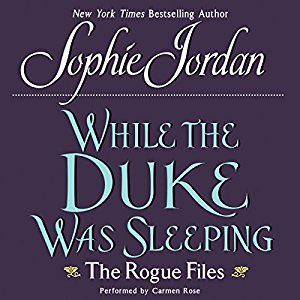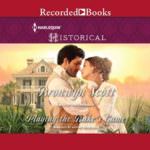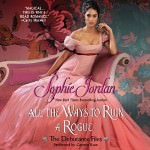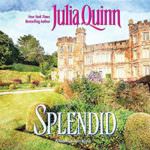How much you enjoy the storyline of While the Duke Was Sleeping (the first in Sophie Jordan’s new series, The Rogue Files) may well depend on how familiar you are with the plot of the 1995 Rom Com, While You Were Sleeping and whether or not you enjoyed it. Adapting a plot from a well-known source can be a double-edged sword, as fans of the original are bound to make comparisons, although some such retellings have worked extremely well. Clueless, for example, is a brilliant re-working of Jane Austen’s Emma, successfully translating the action of the novel to Beverly Hills while keeping very much to the spirit of the original. And Sophie Jordan’s isn’t the only Historical-Romance-Rom-Com-Makeover currently doing the rounds; Maya Rodale’s current series, Keeping Up with the Cavendishes also uses famous films as the inspiration for its plotlines, having so far mined Bridget Jones’ Diary and Roman Holiday.
Coming back to While the Duke… now I’ve listened to it, I think anyone considering it would be best off NOT thinking about the original movie while listening. In fact, the only real similarity between the two is the premise; in the film, lonely Lucy falls for the gorgeous guy she sees every day from her booth at the train station and after she saves his life, a mix up leads his warm, loving and wonderfully scatty family to believe she is his fiancée. In the book, shop-girl Poppy Fairchurch worships the handsome Duke of Autenberry from afar, eagerly awaiting his weekly visit to the flower shop where she works. When he becomes involved in an altercation with another man in the street and is knocked into the path of an oncoming carriage, Poppy pulls him to safety, and is afterwards mistaken for the duke’s fiancée.
So far, so similar, but right there is a bit problem. While it’s clear that movie-Lucy doesn’t move in the same high-powered (what we’d have called “yuppie” in the 80s!) circles as does the object of her affection, in the 1990s, there were no class distinctions that would have caused too many raised eyebrows at the idea of them as a couple. But in the early 1800s, the social difference between a duke and a shop-girl was absolutely huge, and while I read and listen to romance novels for a bit of enjoyable escapism, cross-class romances are very difficult to pull off because of the need to maintain at least some degree of awareness of the class distinctions and social conventions of the time. Sure, I like a good Cinderella story as much as the next person so I’m willing to suspend disbelief to an extent, but what really bothers me here is the ease with which the unconscious duke’s family accepts Poppy as his fiancée without batting an eyelid. In the movie it works – here, not so much. I also couldn’t work out why Poppy, who we’re told can speak four (or five?) languages and is obviously well-educated is working in a shop.
When Poppy rushes to the duke’s aid, he is involved in a fight with a man who later introduces himself as Struan Mackenzie, Autenberry’s half brother. He has come to London to confront his father and to show him that the boy for whom he didn’t give a damn and whose mother he left to a life of prostitution and poverty has made something of himself and could now purchase Autenberry’s estates using his small change. When Struan discovers his father is dead, he approaches his half-brother, hoping that perhaps they can establish some sort of relationship, but is rejected outright. A chance meeting in the street leads to harsh words and to fisticuffs – Autenberry throws the first punch – and then to the accident which leaves the duke comatose.
The storyline proceeds as per the original, with Poppy finding herself unexpectedly drawn to the duke’s brother and he to her, even as Poppy continues to maintain the fiction that she is the duke’s betrothed. But soon, her desire to continue the deception becomes bound up with her liking for the duke’s family and her gratitude for their care and kindness towards her and her younger sister (who is a fifteen-year-old seductress-in-training), and her wish not to upset or disappoint them before it’s absolutely necessary.
This is a romance, so of course there’s an HEA, and fans of the film will know how it all turns out. But I said earlier that it’s probably best to listen to this without reference to the film, so how does the book stand up on its own as an historical romance? I’m afraid the answer to that is not especially well. There are several glaring historical inaccuracies which I’m sure have arisen as a consequence of the author’s taking characters from the 1800s and trying to fit them into the holes made by characters from the 1990s, and I was taken out of the story a few times as a result. On the positive side, the two leads are attractive and engaging characters; Poppy is kind, sweet and optimistic, in spite of the fact that she and her sister are now alone in the world, and Struan’s unhappy background and his drive to succeed add depth to his character. But I couldn’t really buy them as a couple. There’s plenty of sniping and verbal sparring, numerous forbidden kisses and touches that get quite steamy – and are then regretted – but I never heard a relationship developing, and there’s a lack of emotional connection between them.
Carmen Rose is a narrator I’ve listened to quite a lot, and my ratings for her work have tended to vary considerably. She’s received A- grades at her best, but most recently has rarely received anything higher than a B- from me. I’m not sure if that’s because I’ve listened to her a lot and am less tolerant of her quirks and ticks, or if it’s because she’s recording a lot of historical romance and it’s getting stale for her; but whatever the reason, her performance here never really comes to life and I actually found myself zoning out and having to rewind on several occasions when neither she nor the material was holding my interest. A top-notch narrator can keep a listener engaged in a less than scintillating book, but the marriage of an average story and an average narration is going to equal an average audiobook, and that’s what I felt I’d heard when I finished While the Duke Was Sleeping. It’s not a bad book or a terrible performance; I’m used to Ms. Rose’s odd intonation and breathing patterns by now (although that doesn’t mean I like them), and at least the somewhat dodgy Scottish accent she adopts for Struan isn’t as horrible as some of her Scottish accents have been in the past. The pacing is fine and her character differentiation is good all round. I just felt as though she sounded like she’d rather be doing something else, and that disconnect no doubt communicated itself to me given what I said before about zoning out.
I can’t really recommend While the Duke Was Sleeping, for fans of the film or for people who don’t know it but are looking for a new historical romance to listen to. Movie fans will probably be disappointed at the changes the author has made in order to fit the original story into her historical setting, and romance fans will probably be disappointed at the lack of chemistry and actual romance. To cheer myself up, I’m going to dig out my DVD of While You Were Sleeping and remind myself of why it’s such a terrific feel-good movie.
Caz
Narration: C+
Book Content: C+
Steam Factor: Glad I had my earbuds in
Violence Rating: Minimal
Genre: Historical Romance
Publisher: Harper Audio
While the Duke Was Sleeping was provided to AudioGals by Harper Audio for a review.
[jwl-utmce-widget id=32435]



